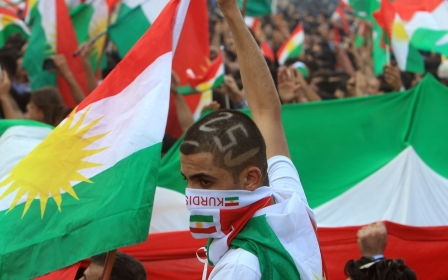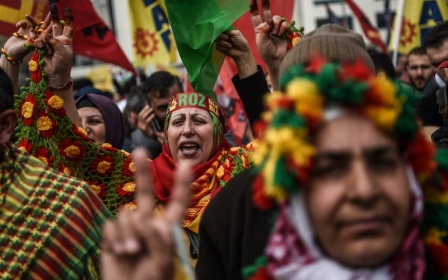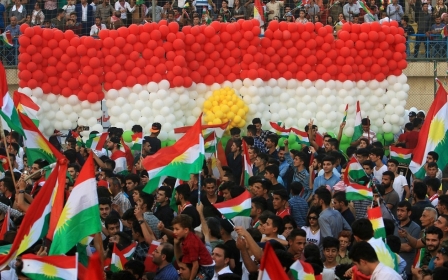Iraq's Kirkuk supports independence vote, but not its neighbours

By Ali Choukeir
Most residents in Iraq's oil-rich province of Kirkuk support taking part in an independence referendum for Iraqi Kurdistan, but in neighbouring Tuz Khurmatu some say they are ready to fight it.
Kirkuk is disputed by the federal government in Baghdad and the Iraqi Kurdish capital Erbil, but has said it is taking part in the 25 September poll.
In the provincial capital of Kirkuk, abundant red, white and green flags show most of the population is Kurdish.
But the city, which Iraq's former Kurdish president Jalal Talabani dubbed "The Jerusalem of Kurdistan" for its multiple communities, is also home to Arabs and Turkmen who are against the poll.
Rumours have been rife, since Kirkuk said it would take part, that the province's different communities are stockpiling weapons in anticipation of clashes.
Baghdad has rejected the referendum as unconstitutional, and this month fired Kirkuk's Kurdish governor Najm Eddine Karim over his provincial council's decision to take part.
"All the talk about the situation in Kirkuk being tense are lies from people wishing it to happen," said Karim, who has refused to step down and in whose office hang both the Iraqi and Kurdish flags.
The governor, a 71-year-old neurologist who holds American nationality, was the one to push his province into taking part in the poll.
Kirkuk is not included in Iraqi Kurdistan, which is made up of the three provinces of Erbil, Dohuk and Sulaimaniyah.
Iraqi Kurdistan says Kirkuk is historically Kurdish, but many Kurds fled and Arabs moved there instead under former Iraqi dictator Saddam Hussein.
"These rumours seek to create chaos so the prime minister (Haider al-Abadi) has a reason to send in troops to Kirkuk," the governor said.
'His troops were already here, and lost to Daesh'
- Kirkuk's Governor Najm Eddine Karim
"His troops were already here, and lost to Daesh," the governor said mockingly, using an Arabic acronym for the Islamic State (IS) group.
Iraqi Kurdish Peshmerga forces have been in sole control of a chunk of Kirkuk since federal forces withdrew in the face of a sweeping IS offensive in 2014.
But the referendum is not welcome in all multi-communal areas disputed by Erbil and Baghdad.
In the neighbouring province of Salaheddine, south of Kirkuk, an official from the Hashed al-Shaabi paramilitary umbrella group said he would not allow the poll in the disputed town of Tuz Khurmatu.
"The referendum will not happen here, in our region. We won't allow it," said the official from the group dominated by Iran-backed Shia militias.
"It's only a way to pressure the central government," Atef Annajar said of the poll.
"We're ready for a fight to the death," he said, though he added "the leadership is trying to calm the situation".
The Kirkuk governor dismissed the threats.
"There are no disagreements between the Hashed al-Shaabi and the Kurdistan forces... but the Hashed is not an organised force and some of its elements try to create problems," Karim said.
"Our forces are ready at any time," he added.
Hadi al-Ameri, head of the powerful Iran-backed Badr organisation, last week vowed to defend the unity of Iraq, warning that the poll could trigger partition and civil war.
On 16 September, a car bomb killed three people in Kirkuk.
Neighbouring Turkey and Iran - who count sizeable Kurdish communities - have opposed the non-binding poll, as have several Western countries and the United Nations.
The United States has warned it may not be able to help Iraq's Kurds negotiate a better deal with the Iraqi government if they go ahead with an independence vote.
New MEE newsletter: Jerusalem Dispatch
Sign up to get the latest insights and analysis on Israel-Palestine, alongside Turkey Unpacked and other MEE newsletters
Middle East Eye delivers independent and unrivalled coverage and analysis of the Middle East, North Africa and beyond. To learn more about republishing this content and the associated fees, please fill out this form. More about MEE can be found here.




